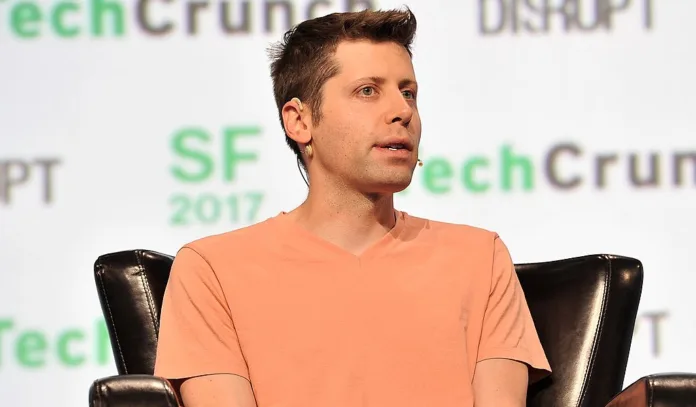OpenAI CEO Sam Altman shares innovative use of GPT-4o to enhance productivity, highlighting the model’s versatility
OpenAI’s latest AI model, GPT-4o, has already started to make waves less than a week after its release. CEO Sam Altman recently discussed how he has integrated the model into his work routine in a way he describes as “surprisingly cool.”
During an episode of The Logan Bartlett Show podcast published on Tuesday, Altman explained his novel use of GPT-4o. He described a method where he places his phone on the table while working intensely, allowing him to use the AI model without interrupting his workflow. “I’ve only had it for like a week or something,” he said, “but one way of using it is putting my phone on the table while I’m really in the zone of working, and then, without having to change windows or change what I’m doing, using it as like another channel.”
Embed from Getty ImagesAltman elaborated on the benefits of this approach, stating, “So I’m working on something, I would normally stop what I’m doing, switch to another tab, Google something, click around or whatever, but while I’m still doing it, to just ask and get an instant response without changing from what I was looking at on my computer, that’s been a surprisingly cool thing.”
OpenAI announced the release of GPT-4o on Monday, highlighting the model’s capabilities, including real-time translations and the ability to interpret physical surroundings to answer questions. This new iteration builds on the success of its predecessors by offering even more advanced functionalities, which Altman is now leveraging to streamline his tasks.
Beyond his innovative use of GPT-4o, Altman also shared personal insights during the podcast. He spoke about the challenges of being one of tech’s most recognizable figures, particularly around San Francisco, where he finds it difficult to dine out publicly due to a lack of privacy. “It’s a strangely isolating way to live,” he noted.
Altman also reflected on his brief ousting from OpenAI last year, describing it as an “adrenaline-charged state” during the few days following his firing before he was reinstated as CEO. This experience underscored the volatile nature of leadership in the tech industry and the resilience required to navigate such challenges.
The release of GPT-4o marks a significant milestone for OpenAI, offering users a powerful tool for various applications. Altman’s firsthand experiences with the model not only showcase its potential but also provide a glimpse into how cutting-edge technology can transform everyday work practices.
As the tech community continues to explore the possibilities of GPT-4o, Altman’s use case serves as an inspiration for innovative integration of AI into professional workflows. The model’s ability to provide seamless, real-time assistance without disrupting tasks highlights the evolving role of AI in enhancing productivity and efficiency.
Analysis
Sam Altman’s integration of GPT-4o into his daily work routine exemplifies the transformative potential of AI in professional settings. From a technological perspective, the ability of GPT-4o to operate as a real-time assistant without requiring users to switch tasks or windows represents a significant advancement in AI usability. This seamless interaction can greatly enhance productivity, particularly for individuals in high-demand roles who need to manage multiple streams of information simultaneously.
Economically, the deployment of such advanced AI models could lead to increased efficiency and cost savings across various industries. By reducing the time spent on switching between tasks and searching for information, professionals can focus more on high-value activities. This could translate into higher output and improved performance, ultimately benefiting businesses and economies at large.
From a sociological standpoint, Altman’s comments on the isolating effects of fame highlight a broader issue faced by many public figures in the tech industry. The loss of privacy and the challenges of maintaining a normal social life can impact mental health and well-being. This aspect underscores the need for support systems and privacy measures to help high-profile individuals cope with their unique challenges.
Politically, Altman’s brief removal and reinstatement as CEO of OpenAI illustrate the dynamic and sometimes precarious nature of leadership positions in tech. The incident reflects broader governance issues within tech companies, where power struggles and boardroom dynamics can have significant implications for the direction and stability of an organization.
Locally, Altman’s experiences in San Francisco point to the cultural and social environment of tech hubs. The city’s role as a center for innovation comes with its own set of challenges, including the public’s intense interest in tech leaders. This phenomenon can lead to a heightened sense of scrutiny and pressure on individuals who drive technological advancements.
From a gender and minority perspective, Altman’s visibility as a tech leader can have positive and negative ramifications. On one hand, his high profile can inspire aspiring tech professionals. On the other hand, the intense scrutiny he faces can serve as a cautionary tale about the pressures associated with such roles. Ensuring diverse representation in tech leadership is crucial for fostering an inclusive industry that supports leaders from all backgrounds.
Sam Altman’s innovative use of GPT-4o showcases the practical applications of advanced AI in enhancing productivity and efficiency. His personal experiences highlight the multifaceted impact of technology on professional and personal lives. As AI continues to evolve, its integration into daily workflows will likely become more common, driving significant changes in how we work and interact with technology.
